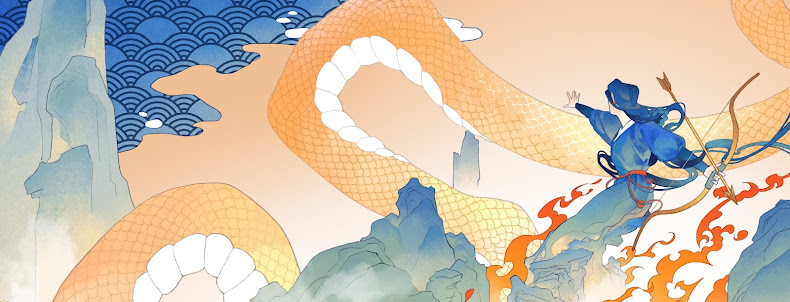Part One tells how a young orphaned peasant girl named Rin, in order to flee her destiny of being married off against her will, succeeds against all odds in entering the Nikara Empire’s most prestigious military academy at Sinegard, the capital. All her fellow students come from noble families, which make her feel like a fish out of water. But her strong will, intelligence and grit pit her against Nezha, the brilliant and arrogant son of the Dragon Province Warlord, who is way beyond her match in combat training, and who has no qualms in belittling her. In a year-end tournament, she accidentally discovers that she can call up a hidden lethal flame. Her desire for supernatural power urges her to take up apprenticeship in Lore (which focuses on the study of shamanism) with Master Jiang, who teaches her to meditate in order to access the deities of the Pantheon, but warns her that asking for power bears a price.
During her two years at the academy, she comes to befriend Kitay, who is a walking encyclopedia, and she secretly admires Altan, the attractive and invincible combatant and the only war survivor from the island of Speer, which a few decades earlier was brutally annihilated by Mugen. Then comes the day when the academy students learn that the newly enthroned Mugen Emperor is planning to invade the Nikara Empire.
In Part Two we see the academy Masters and students being drafted into military divisions in preparation for Mugen’s invasion into Sinegard. During a bloody scuffle, Rin manages to call up her flame to incinerate Nezha’s attacker. When the Masters at the academy see that, they send her to the Cike, which is a group of assassins that will fight as the Thirteenth Division under Altan’s command. She then discovers that she is also a surviving Speerly, like Altan, and that the assassins are all shamans who can call the gods for aid. Under orders from the Nikara Empress, Altan leads the Cike to Khurdalain, the war front. After beating back the Mugenese army from the coast, Altan receives news that Golyn Niis to the south is under siege. The Cike must go to their rescue.
Part Three describes the carnage and aftermath of Mugen’s massacre at Golyn Niis, as recounted to the Cike by Kitay and another female student. Many of the academy Masters and students have been savagely killed. To avenge them, and to save the Nikara Empire, Altan and Rin want to seek help from powerful but retired shamans who are imprisoned in a stone mountain. On their way out, they are waylaid by Mugenese soldiers and unspeakable things happen to them. A brutal truth of betrayal is also revealed. Rin becomes so heart-broken and enraged that she is determined to ask the Phoenix (the goddess of fire and vengeance) to grant her the power for revenge, knowing full well that she has to pay a price for it.
I might mention that I had previously read The Good Man of Nanking: The Diaries of John Rabe, which is an eye-witness account of the Nanjing massacre. Here’s my review: https://www.goodreads.com/review/show/1961225283
PS: Since finishing all three books in the trilogy, I've had second thoughts about the author's plot points choices. It's well understood that the story is based on the Second Sino-Japanese War in general and the Nanjing massacre in particular. In The Popper War there's the insensitive playing upon the Nanjing massacre victims's sufferings for melodramatic effects. The whole idea of making a gender-bending parody out of a prominent albeit unlikable historical character (Mao Zedong) and of exploiting a piece of traumatic Chinese history for the sake of profit-making doesn't sit well with me.

No comments:
Post a Comment